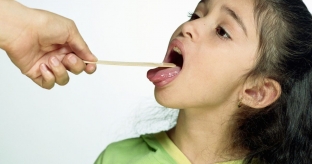Every third child develops the smell of acetone from the mouth, from 2 years up to 12 years of age (acetonemic syndrome). Ammonia breath and the presence of acetone in the urine are especially dangerous for children from one year old. Often parents remain helpless in a situation where the first attacks of acetonemic syndrome appear, which threatens the life of the baby.
Even such a seemingly harmless symptom as tearfulness or fatigue, in the future may result in vomiting and an increase in the level of acetone in the baby's body. Acetone breath from the mouth means a violation of the liver, kidneys, pancreas, thyroid gland. So, let's consider what the smell of acetone from the mouth of a child signals and what to do in the first place.
Smell of acetone from the mouth of a child: causes
Factors influencing the increase in ketone bodies overtake the child's body in a weakened state and provoke the accumulation of acetone and deterioration of well-being. If a child’s mouth smells terribly of acetone or ammonia, this can mean the development of many diseases and pathologically dangerous conditions.
Causes of acetone breath odor:
- Incorrect nutrition. Passion for fatty foods, salty, sweet or foods with various chemical additives (juices, yogurts). Excessive consumption of harmful foods and additives will sooner or later provoke acetonemia. This applies to one-year-old children, especially children after 2-3 years old, when parents introduce the kids to the common table. The menu of a child up to 3 and even up to 5 years (in some cases, for example, with intolerance to glucose or gluten) should be significantly different from an adult.
- Liver problems. When the natural filter in the body refuses to properly remove toxins and waste products, uric acid accumulates in the tissues and the smell of acetone from the child’s mouth appears, intoxication of the body begins.
- Intestinal dysbacteriosis. In the intestines, when digestion is disturbed, fermentation begins and a significant part of the carbohydrates that are so necessary for the child's body are lost.
- Problems with the pancreas are a common cause of bad breath. This body is responsible for the process of splitting carbohydrates, producing special enzymes for this. With dysfunction, the pancreas produces an insufficient amount of enzymes, which affects other disorders and the development of diabetes mellitus, acetone syndrome.
- Problems with the production of hormones by the adrenal glands. This is especially true for the stress hormone. This occurs due to the presence of stressful situations: when bullying a child, when moving, during a long journey, during the first trips to a kindergarten or school. Any stressful situations can introduce an imbalance in the production of hormones and fats will begin to be consumed in the body instead of carbohydrates to provide energy reserves, which leads to an increase in the level of acetone.
In addition, the smell of acetone appears due to infection with worms, during the course of diseases of the ENT organs.

Symptoms with an increase in acetone in the urine of a child
- pallor, blue circles under the eyes;
- drowsiness, lethargy, weakness;
- vomiting, especially after eating;
- pain in the umbilical region;
- increase in body temperature;
- smell of acetone in urine, mouth, all over body.
To determine the level of acetone in the urine, you must use pharmacy tests that determine the amount of ketone bodies. When contacting a doctor (pediatrician or pediatric gastroenterologist), laboratory tests are prescribed:
- general analysis of urine and blood,
- urinalysis for acetone,
- fecal analysis for the presence of worms,
- blood test to determine the level of sugar,
- stool analysis for dysbacteriosis.
Algorithm of action: how to help a child with an acetone smell
If the signs of acetonemia are insignificant and have only begun to actively worsen the child's well-being, it is necessary to test for the level of acetone and solder the child.
Acetonemia Fluid:
- fruit drinks;
- compotes (raisins, dried fruits);
- Borjomi (without gas);
- tea sweetened with honey;
- rice congee.
The task of desoldering: replenishing blood glucose, preventing dehydration and stopping vomiting. Drinking should be fractional, you should not give the child too much to drink, this can cause even more dehydration and vomiting. Regidron can be used as a pharmacy remedy for soldering.
If the condition worsens and the acetone level rises, an ambulance should be called and the child hospitalized.
On the first day of the acetone crisis, it is better for the baby to stay hungry and drink more. When the condition improves and the level of ketone bodies stops growing, the child can be given crackers, rice porridge, vegetable soup. Portions should be small, and eating – frequent.
You should consult your doctor about what medications to take to improve your general condition and lower acetone. In addition to treating the symptoms of acetonemia, attention should be paid to getting rid of the root cause, that is, the disease that served as the starting point.






Add a comment